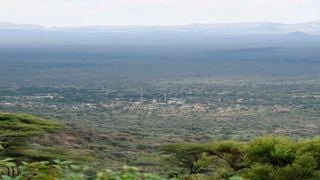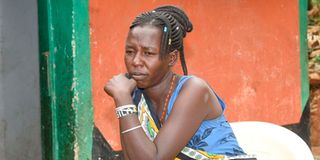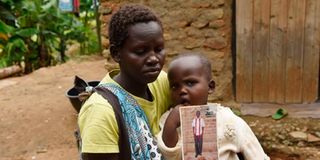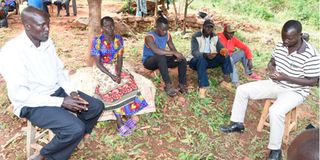
A vantage view of Tot Tradinge Centre in Elgeyo Marakwet County, from Kamoko village on the Kerio valley escarpment in this picture taken on November 30, 2021.
| Jared Nyataya | Nation Media GroupNews
Premium
Bandits ride roughshod on Kerio ‘valley of death’
What you need to know:
- Children have been orphaned and women widowed by the frequent attacks by the marauding cattle thieves.
- In peacetime, the local markets would be bustling with trading activities, but now they remain deserted.
Last Saturday dawned as a calm day in the quaint Kerio Valley, with the sun’s rays illuminating the rolling Tugen Hills and the cascading Mau escarpment in the distance.
But this tranquil ambience, as often happens, was cut short by shrill wails and pandemonium after 60 heavily armed bandits from a neighbouring county struck Kapkobil grazing fields, killing four people, including a volunteer police reservist, and disappearing into the dense bushes with more than 190 animals.
Sammy Kirotich, 45, Elkana Kitum, 24, Cornelius Kirop, 29, and Kennedy Nyamongo, 34, were shot dead by the brazen attackers who roam the region unmolested, killing, maiming and stealing without a care in the world.

Sammy Kirotich, 45, who was among four herders killed by cattle raiders at Kapkobil in Elgeyo Marakwet County from the neighbouring community last Saturday.

Kennedy Nyamonge, who was among four herders killed by cattle raiders at Kapkobil in Elgeyo Marakwet County.

Cornelius Kirop, 29, who was killed by cattle raiders at Kapkobil in Elgeyo Marakwet County.

Cornelius Kirop, 29, who was killed by cattle raiders at Kapkobil in Elgeyo Marakwet County.
The four are among the latest victims of bandit attacks in Kerio Valley, which has come to be known as the ‘Valley of death’.
The region, whose picturesque topography gives it a lot of tourism potential, has been plunged into gloom and debilitating poverty. Children have been orphaned and women widowed by the frequent attacks by the marauding cattle thieves.
It is now the norm for learners to skip classes for fear of being caught in gunfights.
At Kapkobil Primary School, the epicentre of the Saturday attack, there were only 18 out of 245 pupils when the Nation visited the institution on Monday.
In peacetime, the local markets would be bustling with trading activities, but now they remain deserted.
Several multimillion-shilling projects, funded by both the national and the county governments, have stalled.
These include the Sh300 million Tot-Kolowa irrigation scheme, Kabetwa, Kapkobil, Kaasegei irrigation projects as well as the Kerio Valley Development Authority’s animal multiplication centre.
Grieving families
Farms have long been abandoned after families relocated to the rocky shoulders of the Mau escarpment, leading to acute scarcity of food.
Residents fear that bandits fleeing a sustained security operation in Laikipia may have found a safe haven here.
In Kamoko and Kaasegei villages in Marakwet East sub-county, the grieving families of the four who were felled by the bandits on Saturday are preparing to bury their breadwinners later this week.
The families have joined a growing list of those widowed or orphaned by the senseless killings that residents say have gone on here for far too long.

Thasila Cheserek, a mother of 7, whose husband Sammy Kirotich, 45, who was among four herders killed by cattle raiders.
Kirotich’s widow, Ms Thasila, is still shaken by memories of the Saturday raid.
“My husband left with the herders before 9am to the grazing fields. He was providing security. He’d normally wake up at 5am to survey the footpaths. In case he spotted any strange footprints, he would warn the villagers not to release their children to go to school. Now that he has been killed we are on our own,” said the mother of seven amid sobs.
“I do not know what tomorrow will bring,” she said, adding that danger lurks everywhere in the entire Kerio Valley region.
“In Kerio Valley, we live each day at a time. Women and children no longer spend the nights in their houses but in the caves up the hilly escarpment as the men guard their homes,” narrates Thasila.
A stone’s throw from Kirotich’s homestead we find mourners gathered at Nyamongo’s home for burial arrangements.
To reach the village, one has to cut through through thickets, climb over rocks and occasionally hop across water furrows.
It took us an arduous one-hour trek to reach Nyamongo’s home.
Victims of banditry
“This is my fourth home. We have had to set up new abodes at the peak of the escarpment to ward off the bandits, but the killings are too many,” said Nyamongo’s widow, Rael.
“I have lost my husband and our 15 animals. Now I am all alone with the children and it will take a miracle to provide for them. My husband was our source of security. We do not know what to do,” said the distraught mother of six.
Ms Nyamongo accused the government of inaction in the wake of the attacks.
“We are desperate for a solution and tired of frequent promises by government officials that they will restore order as our people continue being killed. We are not children of a lesser God and the government should deal with bandits so that we can at least go back to sleeping in our houses,” she wailed.
At Kirop’s home, the situation was no different. We found a devastated Ms Edith Jepchumba trying to come to terms with the loss of her husband.
“My husband was an industrious man whom we depended on. We looked forward to a great future together. Now that I have lost him and our 21 head of cattle, I do not know how life will be. He had also promised to take me to college after I deliver our second baby later this year,” she states.

Edith Chepchumba, 21, a mother of one whose husband Cornelius Kirop, 29, was among four herders killed by cattle raiders.
“We have been neglected by the government for ages. If the state still values us, it should end banditry and wipe away our tears. It is sad that every weekend there are burials of victims of banditry,” she lamented.
In Kaasegei village, Mzee Paul Kisang’s family is mourning the death of their first-born son, Kitum, who was killed and 67 of the family’s animals stolen.
“Killings are being reported daily in Kerio Valley. Where is the government? We are almost giving up! Even security officers have resorted securing their lives first,” lamented Mzee Kisang.

Paul Kisang (left) and his wife Linah Chebowen, the parents of Elkana Kitum Kirop, 24, who was among four herders killed by cattle raiders at Kapkobil in Elgeyo Marakwet County.
He said officers at Kapkobil police post were firing shots through the window as they too were scared of the bandits, who outnumbered them.
Organised crime
“How can three police officers run an outpost? The bandits were more than 60 and each had a gun. How do you expect them to respond? The government is to blamed for the menace,” he said.
And in its report titled 'Mending the Rift', the Kenya National Commission on Human Rights (KNHCR) says successive governments have failed to address the outdated cattle rustling, which has hampered socio-economic development in the region.
The report links the practice to dwindling resources due to climate change.
It also partly blames the menace on organised crime and illegal guns in the hands of civilians.
Inadequate policing, diminished role of traditional leaders, political incitement and increased poverty levels are among the other factors cited in the report.
Mr Titus Kanda Kaasegei said over the past four months, more than 40 people have been killed and thousands of livestock stolen.
“It is shocking that the government asks villagers to be vigilant whenever they report that they have spotted the bandits. We are tired and want them to reinstate the police reservists. We believe they are in a better position to offer security,” he noted.
Marakwet Kenya National Union of Teachers (Knut) branch executive secretary John Cheberi said they would hold a demonstration next week to protest against the runaway insecurity that has led to the closure of schools along the volatile Kerio Valley.
Elgeyo-Marakwet County police commander Patrick Lumumba said the bandits have lately been ambushing herdsmen and spraying them with bullets.
“At the moment we are conducting joint patrols bringing together police officers from Baringo, West Pokot and Elgeyo-Marakwet counties. We are also urging locals to be volunteering security information to the police. We need collaboration to end the banditry menace in Kerio Valley,” he said.





